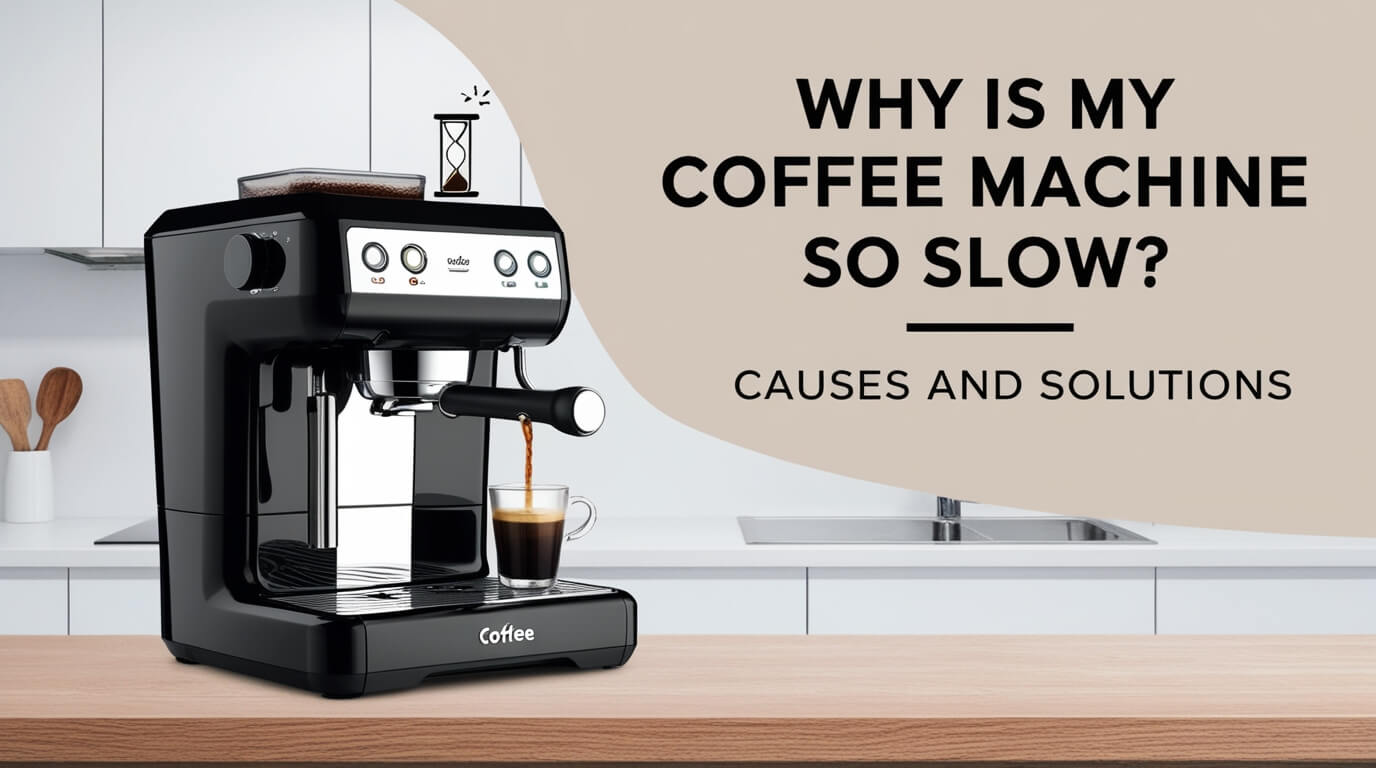
A slow coffee machine can be frustrating, often caused by mineral buildup, incorrect grind size, or maintenance issues. By identifying the root cause and applying the right fixes, you can get your coffee maker brewing quickly again.
Are you standing in front of your coffee maker, watching it drip at an agonizingly slow pace? You’re not alone. Many coffee lovers face this common problem, and it’s more than just a minor inconvenience. A slow coffee machine can ruin your morning routine and even affect the taste of your brew.
In this comprehensive guide, we’ll explore the reasons behind sluggish coffee makers and provide practical solutions to get your machine back up to speed. We’ll cover everything from simple DIY fixes to more advanced troubleshooting techniques, ensuring you have all the information you need to enjoy fast, efficient brewing once again.
Coffee Machine Slowdowns
Before we dive into solutions, it’s crucial to understand what’s happening when your coffee machine slows down. This knowledge will help you pinpoint the issue and apply the right fix.
Common Signs of a Slow Coffee Maker
How do you know if your coffee machine is truly slow? Here are some telltale signs:
- Brewing time has increased significantly
- Coffee drips instead of flows
- Water seems to pool in the filter basket
- The machine makes unusual noises during brewing
If you’ve noticed any of these signs, it’s time to investigate further.
The Impact of Slow Brewing on Coffee Quality
A slow coffee machine doesn’t just test your patience; it can also affect the quality of your coffee. When water passes through the grounds too slowly, it can lead to over-extraction, resulting in bitter, unpleasant-tasting coffee. On the flip side, if the machine is so slow that the water cools down too much, you might end up with under-extracted, weak coffee.
Mineral Buildup: The Silent Culprit
One of the most common reasons for a slow coffee machine is mineral buildup. Over time, minerals from your water can accumulate inside the machine, clogging tubes and affecting performance.
How Mineral Deposits Affect Brewing Speed
Mineral deposits, also known as scale, can narrow the passages water flows through in your coffee maker. This restriction slows down the brewing process and can even lead to complete blockages if left unchecked.
Identifying Mineral Buildup in Your Machine
Look for these signs of mineral buildup:
- White, chalky residue inside the water reservoir
- Mineral spots on the heating plate
- Unusual taste in your coffee
- Longer brewing times
If you spot these signs, it’s time to descale your coffee maker.
Grind Size and Coffee Amount: Finding the Right Balance
The size of your coffee grounds and the amount you use can significantly impact brewing speed. Getting this balance right is crucial for optimal performance.
The Role of Grind Size in Brewing Speed
If your coffee is ground too finely, it can impede water flow, causing slow brewing. Conversely, if the grind is too coarse, water might pass through too quickly, leading to weak coffee.
How Much Coffee Should You Use?
Using too much coffee can also slow down your machine. It creates resistance, making it harder for water to pass through. As a general rule, use about 1 to 2 tablespoons of ground coffee per cup of water, adjusting to your taste preferences.
Filter Problems: A Common Cause of Slow Brewing
Your coffee filter plays a crucial role in the brewing process. Using the wrong type or improperly placing it can lead to slow brewing.
Choosing the Right Filter Type
Different coffee makers require different types of filters. Using the wrong one can restrict water flow. Always check your machine’s manual for the recommended filter type.
Proper Filter Placement and Usage
Ensure your filter is seated correctly in the basket. A misplaced filter can cause water to pool, slowing down the brewing process. Also, avoid using multiple filters at once, as this can severely restrict water flow.
Maintenance Issues: Keeping Your Machine in Top Shape
Regular maintenance is key to preventing slowdowns and ensuring your coffee machine operates efficiently.
The Importance of Regular Cleaning
Clean your coffee maker regularly to prevent buildup of coffee oils and residue. These can accumulate over time, affecting both brewing speed and coffee taste.
Checking and Replacing Parts
Inspect your machine’s parts regularly for wear and tear. The water pump, valves, and seals can degrade over time, leading to slower brewing. Replace these parts as needed to maintain optimal performance.
Water Quality and Temperature: Often Overlooked Factors
The quality and temperature of the water you use can have a surprising impact on your coffee machine’s performance.
How Water Quality Affects Brewing Speed
Hard water contains more minerals, which can lead to faster buildup in your machine. Consider using filtered or softened water to slow down mineral accumulation and maintain brewing speed.
The Role of Water Temperature in Coffee Extraction
If your machine isn’t heating water to the right temperature, it can lead to slow brewing and poor-tasting coffee. The ideal brewing temperature is between 195°F and 205°F (90°C to 96°C).
Advanced Troubleshooting: When Simple Solutions Don’t Work
Sometimes, the issue goes beyond simple fixes. In these cases, you’ll need to dig a little deeper to solve the problem.
Checking for Clogged Valves and Tubes
Mineral deposits or coffee grounds can clog the internal components of your machine. Carefully disassemble your coffee maker (if possible) and check for blockages in the tubes and valves.
Addressing Pump and Pressure Issues
A weak or faulty pump can lead to slow brewing. If you’ve tried other solutions and your machine is still slow, the pump might be the culprit. This often requires professional repair or replacement.
DIY Solutions: Fixing a Slow Coffee Machine at Home
Many slow coffee machine issues can be resolved with simple DIY solutions. Here are some steps you can take at home:
Step-by-Step Guide to Descaling Your Coffee Maker
- Mix equal parts water and white vinegar
- Fill your machine’s water reservoir with this solution
- Run a brew cycle without coffee grounds
- Rinse by running 2-3 cycles with clean water
- Repeat if necessary
Quick Fixes for Common Slowdown Issues
- Clean the shower head with a soft brush
- Check and clean the water reservoir
- Ensure the carafe is properly placed
- Use the correct amount of coffee grounds
When to Seek Professional Help or Consider Replacement
While many issues can be resolved at home, some problems require professional attention or even machine replacement.
Signs It’s Time to Call a Technician
- Persistent slow brewing despite DIY fixes
- Unusual noises or leaks
- Inconsistent water temperature
- Machine is over 5 years old and showing multiple issues
Factors to Consider When Replacing Your Coffee Machine
- Frequency of use
- Desired features
- Budget
- Brand reliability and warranty
Preventing Future Slowdowns: Best Practices for Coffee Machine Maintenance
Prevention is always better than cure. Here are some tips to keep your coffee machine running smoothly:
Daily and Weekly Maintenance Tips
- Rinse removable parts daily
- Wipe down the exterior
- Clean the carafe and filter basket weekly
- Run a vinegar solution through the machine monthly
Long-Term Care for Your Coffee Maker
- Use filtered water to reduce mineral buildup
- Replace worn parts promptly
- Follow manufacturer’s maintenance guidelines
- Consider professional servicing annually for high-end machines
Enjoying Fast, Efficient Brewing Once Again
A slow coffee machine can be a real buzzkill, but with the right knowledge and approach, you can get your morning brew flowing smoothly again. Remember, regular maintenance is key to preventing slowdowns, and addressing issues promptly can extend the life of your machine.
By understanding the common causes of slow brewing and implementing the solutions we’ve discussed, you’ll be well-equipped to tackle any coffee machine slowdowns. Whether it’s descaling, adjusting your coffee grind, or simply cleaning your machine more regularly, these steps will help ensure your coffee maker keeps up with your caffeine needs.
Don’t let a slow coffee machine ruin your day. With a little care and attention, you can enjoy fast, efficient brewing and delicious coffee every time. Here’s to quick brews and great-tasting coffee!






